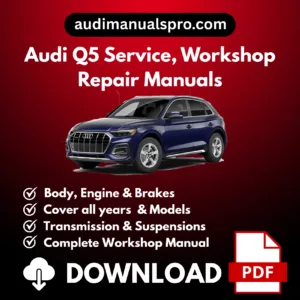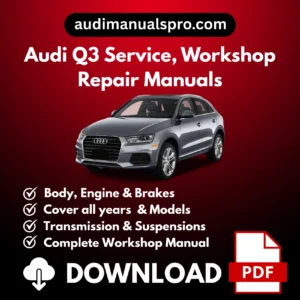Account
-
Safe payment options
We only work with the most secure payment systems.
-
Product return within 30 days
We do our very best to keep our customers happy.
No products in the cart.
You dont have any products in your cart yet, add a few products to experience this experience.
Explore our most popular Audi service & repair manuals.
Click HereAre Audi Cars Reliable or Just Overpriced Hype?

Imagine investing in a sleek, high-performance Audi—only to find yourself frequently visiting the mechanic. Many Audi owners have reported issues such as oil leaks, electrical glitches, and transmission problems, leading to unexpected expenses and frustration. These concerns raise questions about the brand’s reliability and whether the driving experience justifies the potential maintenance challenges.
However, it’s important to note that not all Audi vehicles are plagued with problems. Many owners enjoy years of trouble-free driving, especially when adhering to recommended maintenance schedules. Understanding common issues and their solutions can help prospective buyers make informed decisions and current owners take proactive steps to maintain their vehicles.
What Are the Common Problems with Audi Vehicles?
Although Audi has made significant improvements in engineering over the years, a few consistent issues continue to be reported across multiple models. Understanding these issues doesn’t mean steering clear of the brand—it simply means being better prepared.
1. Oil Consumption and Leaks
Some Audi engines, especially older 2.0 TFSI models, are notorious for burning excessive amounts of oil. This is often due to poorly designed piston rings or valve seals. Left unchecked, low oil levels can lead to engine damage. Oil leaks from gaskets, seals, or the valve cover are also frequently reported. These issues, though not unique to Audi, appear more often than in some competitors’ vehicles.
2. Electrical System Glitches
Audi’s vehicles are filled with advanced electronics, which unfortunately also makes them more vulnerable to failures. Problems with power windows, sensors, digital dashboards, and infotainment units have been flagged by many users. While often fixable, they can be time-consuming and costly to diagnose and repair.
3. Transmission Issues
Some models equipped with the Multitronic CVT or S Tronic dual-clutch systems have shown problems such as jerky shifting, hesitation, or complete transmission failure. Although these gearboxes offer excellent performance when working correctly, they require strict maintenance and software updates to function reliably over time.
4. Suspension Wear
Audis typically have sport-tuned suspensions for improved handling, but these components can wear out faster than average. Control arms, bushings, and shock absorbers are common failure points, especially in areas with rough roads.
5. Cooling System Faults
Radiator leaks, water pump failures, and thermostat malfunctions can also occur, particularly in models with higher mileage. These issues, if ignored, can lead to overheating and major engine damage.
How Do Audi’s Reliability Ratings Compare?
Reliability data varies depending on the source, but Audi often scores mid-range or slightly below average. According to RepairPal, Audi receives a reliability rating of 3.0 out of 5.0, ranking 28th out of 32 car brands. Consumer Reports also places Audi in the lower half of its annual reliability rankings, often due to issues in older models and complex tech systems.
That said, newer Audi models—especially post-2018—have shown improvement. Audi has put more emphasis on quality control and customer service, and some of the latest models such as the A4, Q5, and e-tron are receiving better scores in owner satisfaction and reliability.
Are Maintenance Costs Really That High?
Yes, Audi maintenance costs tend to be higher than average. The annual repair and maintenance cost for Audi vehicles is estimated at around $987, according to RepairPal. This figure includes both regular servicing and unexpected repairs. By comparison, the industry average for all vehicles is about $652 per year.
The higher cost stems from several factors:
- Use of premium parts
- Advanced and complex electronics
- Fewer independent mechanics that specialize in Audi systems
However, owners who stick to their service schedule and resolve small problems quickly often avoid the massive repair bills that give the brand its reputation for being expensive to maintain.
What Can You Do to Make an Audi More Reliable?
If you already own—or plan to buy—an Audi, there are ways to make sure it serves you well for many years.
- Stick to the Maintenance Schedule:
This includes regular oil changes, brake inspections, transmission fluid replacements, and timing belt service (if applicable). Skipping maintenance is one of the fastest ways to run into trouble with an Audi. - Use Genuine Parts and Experienced Technicians:
While generic parts may save money upfront, they can cause long-term problems. Always opt for OEM parts and visit mechanics who are familiar with German vehicles or specialize in Audi repairs. - Buy CPO or Newer Models:
Certified Pre-Owned (CPO) vehicles often come with extended warranties and have passed thorough inspections. Alternatively, newer models usually benefit from more refined engineering and fewer early-generation problems. - Stay Updated on Recalls and Service Bulletins:
Audi, like all manufacturers, issues technical service bulletins and recalls. Addressing these promptly can prevent minor issues from turning into bigger ones.
Final Thoughts
So, are Audi cars reliable? The answer depends on the model, the year, and how well the car is maintained. Audi delivers an excellent driving experience, blending performance with modern design and innovation. But ownership comes with responsibilities—regular maintenance, an understanding of common issues, and occasionally higher repair bills.
If you’re willing to take those on, you’ll likely find the experience rewarding. Audi isn’t for everyone, but for those who prioritize driving dynamics and premium feel, it can be a satisfying long-term choice—so long as you go in with your eyes open.








